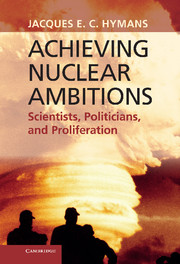Book contents
- Frontmatter
- Contents
- Figures
- Table
- Preface
- Abbreviations
- 1 The puzzle of declining nuclear weapons project efficiency
- 2 A theory of nuclear weapons project efficiency and inefficiency
- 3 Spinning in place
- 4 How did China’s nuclear weapons project succeed?
- 5 Proliferation implications of international civil nuclear cooperation
- 6 Proliferation implications of footloose nuclear scientists
- 7 Empirical extensions
- 8 Lessons for policymakers and directions for future research
- References
- Index
- References
1 - The puzzle of declining nuclear weapons project efficiency
Published online by Cambridge University Press: 05 June 2012
- Frontmatter
- Contents
- Figures
- Table
- Preface
- Abbreviations
- 1 The puzzle of declining nuclear weapons project efficiency
- 2 A theory of nuclear weapons project efficiency and inefficiency
- 3 Spinning in place
- 4 How did China’s nuclear weapons project succeed?
- 5 Proliferation implications of international civil nuclear cooperation
- 6 Proliferation implications of footloose nuclear scientists
- 7 Empirical extensions
- 8 Lessons for policymakers and directions for future research
- References
- Index
- References
Summary
Policymakers typically ask intelligence analysts two standard questions about the likelihood of nuclear proliferation. First, what might cause a given state to seek the bomb? This is considered to be a “political” question. Second, if the state were to seek the bomb, how quickly could it achieve that goal? This is considered to be a “technical” question.
In this book, however, I argue that it is wrong to view the second question as a purely technical one. Political analysis is essential not merely for evaluating states’ propensity to seek nuclear weapons, but also for evaluating their capacity to achieve their nuclear weapons ambitions. For if it is difficult to get intricate centrifuge cascades to spin at high speeds for months on end, it is even more difficult to get large numbers of scientific and technical workers to tackle such challenges with the proper mix of passion and meticulousness. In other words, a crucial, yet widely overlooked determinant of efficient nuclear weapons projects is the top state leadership’s adoption of a management approach that respects scientific workers’ spirit of professionalism. But the mere fact that this is the right management approach does not mean it will be adopted. In many states, weak state institutions permit, and even encourage, top leaders to take actions that undermine that spirit of professionalism, and thereby unintentionally to thwart their own nuclear ambitions.
- Type
- Chapter
- Information
- Achieving Nuclear AmbitionsScientists, Politicians, and Proliferation, pp. 1 - 40Publisher: Cambridge University PressPrint publication year: 2012

